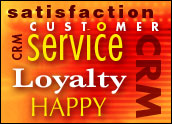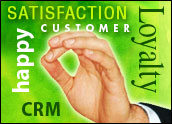
You could say I am a foodie — food and its preparation mean a lot to me.
Far more than sustenance or mere fuel, food for me and my friends is a serious hobby. We care about the differences between heavy gauge steel pots and cast iron, varieties of avocado, Hickory or Mesquite, and fresh vs. frozen. For a long time, I used to make my own beer. When we go camping in the summer it’s a long and delicious exercise in exploring outdoor cooking techniques.
A trip to the grocery store over the weekend changed my outlook on CRM.
Loyalty vs. Membership
I have a wallet that is much thicker than it needs to be because it is full of supermarket loyalty cards. Each store has its own loyalty card and I dutifully carry all of them as well as the membership card I pay for annually at one of the warehouse stores. I actually like the warehouse store best because I feel like I am really getting something when I show the card to get in. Though there is a membership fee, I much prefer it over the numbing assortment of “specials” the traditional supermarkets promote each week to get you through the door.
At the warehouse the price per pound of whole chickens hasn’t budged in years, but at the supermarket it fluctuates like the price of oil on the futures market. And there is always the fact that there are really two prices — the one you get if you’re carrying a loyalty card and the needlessly marked up price if you’re just a citizen visiting.
The warehouse doesn’t have two prices for anything, you either can enter by virtue of your membership or you can’t. So I tend to do most of my shopping at the warehouse and, if I really need something that they don’t carry, I head to the traditional supermarket.
No one has to convince me of the difficulties involved in the supermarket business. Margins are razor thin and competition can be brutal especially in a populated area like the northeast where I live and where there is a lot of competition. That said, I was blown away the other day when the checker at my supermarket pitched a product to me. This particular store chain has instituted a weekly specials program that is only available at the checkout — that sluice gate full of impulse buys like candy, gum, magazines and batteries? If you can think of it as assisted impulse buying you’ve got the picture.
Misuse of Technology
It was precisely that moment that provided the epiphany on which this column is based. We’ve stopped caring about the customer. In customer-facing encounters today, too often it’s all about the transaction. Not surprisingly this has come about from an over-reliance on technology.
Technology gives us the ability to track what every customer buys and to hold that historical record for future information extraction. That’s what a loyalty card is for, after all. By virtue of the data they collect, any store could sell me chicken, but they have zero visibility when I’m looking for something out of my routine and I haven’t had salmon in a while.
Somehow along the way, rather than using technology to optimize the store, its environment and approach to the customer, we decided instead to maximize each transaction, hence the emphasis on assisted impulse buying. And that is the debate lurking in CRM today. Is CRM there to help vendors maximize the individual transaction — essentially an actuarial approach — or is its purpose to optimize the customer experience and by doing that improve customer loyalty and enable repeat business?
But in creating a system that uses technology to track each customer and suggest the obvious we have taken the onus for the transaction from the vendor — where quite arguably it belongs — and placed it on the customer. In the earlier days of retailing, vendors worked hard to earn a customer’s business, today vendors demand that customers be more worthy of the privilege of shopping in their stores, hence the loyalty card concept.
Service Has Its Rewards
Perhaps ironically, also in my neighborhood last weekend, Ikea, the Scandinavian furniture retailer opened a big new store. Traffic to the store was backed up for miles all the way onto the highway and there was no parking to be found at the new store or at any of the adjoining stores that lost control of their parking lots as thousands of consumers hungry for blond wood and Swedish meatballs descended on the place.
I don’t know if Ikea has loyalty cards but I’d bet most of the people who came for the opening didn’t have one. The thousands of people who showed up — some came from as far as Atlanta — and braved the traffic and the lines did so because of Ikea’s reputation for products and service (I hear the meatballs aren’t bad either). That’s rather refreshing.
Denis Pombriant is a well known thought leader in CRM and the founder and managing principal of the Beagle Research Group, a CRM market research firm and consultancy. Pombriant’s latest white paper, Adding Sales to the Call Center Agenda, summarizes his recent research in the call center industry. In 2003, CRM Magazine named Pombriant one of the most influential executives in the CRM industry. Pombriant is currently working on a book to be published next year. He can be reached at [email protected]















































